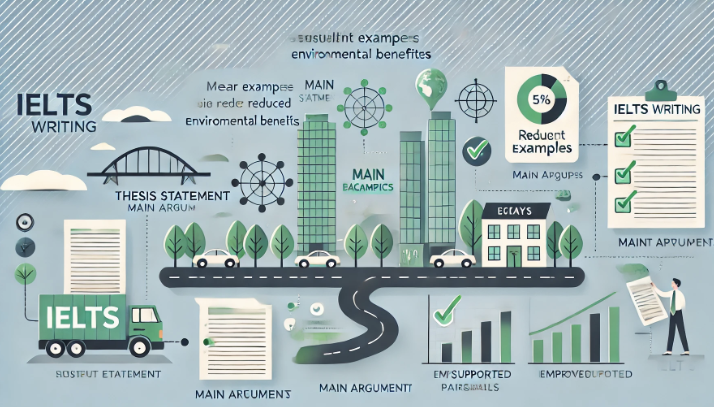
IELTSライティングで上級者が守るべきルールとして、「具体的で関連性のある例やサポートを提示する」というポイントがあります。このルールを守ることで、論理的で説得力のあるエッセイを書くことができます。
以下に、具体例を挙げながら説明します。
ルールの説明
具体的で関連性のある例とは、議論の内容を補強し、読者に明確に伝えるための実際の事例やデータを用いることを指します。
関連性のあるサポートとは、トピックに直接関連し、議論の方向性に沿った情報やアイデアを述べることです。
これにより、抽象的な主張を避け、実際の状況に基づいた説得力のある議論が可能となります。
トピック例:Some people think that public transport should be free for everyone. To what extent do you agree or disagree?
- 主張の提示
“I believe that making public transport free for everyone is beneficial, but it should be implemented with certain limitations.”
- サポートと具体例を使った議論
サポート1: 環境への利点
“Free public transport could significantly reduce air pollution and traffic congestion. For instance, in Luxembourg, where public transport has been made free since 2020, there has been a noticeable decrease in the number of private vehicles on the road.”
サポート2: 経済的メリット
“Free transportation can benefit low-income families who may struggle with daily commuting costs. For example, a study in Sweden showed that free public transport programs in low-income areas improved access to education and employment opportunities.”
サポート3: 制限の必要性
“However, unlimited free access could lead to overcrowding and misuse. In cities like Mumbai, introducing a tiered pricing system for public transport has helped balance affordability and efficiency.”
上級者としてのポイント
● 具体的なデータや事例を引用する。
● 実際の国や都市、統計データを用いることで信憑性を高める。
● サポートがトピックに直接関連していることを確認する。
● 環境問題の議論では、交通量の減少や大気汚染の改善といった関連トピックを選ぶ。
● 反論や制限を認める
● 他の視点にも触れることで、バランスの取れた議論を展開する。
まとめ
上級者は具体例と関連性のあるサポートを活用して、議論を明確で説得力のあるものにします。上記のような手法を用いることで、IELTSの採点基準である「Task Response」において高得点を目指すことができます。







